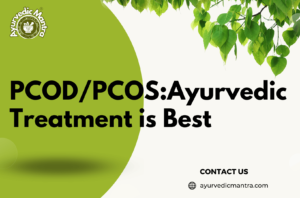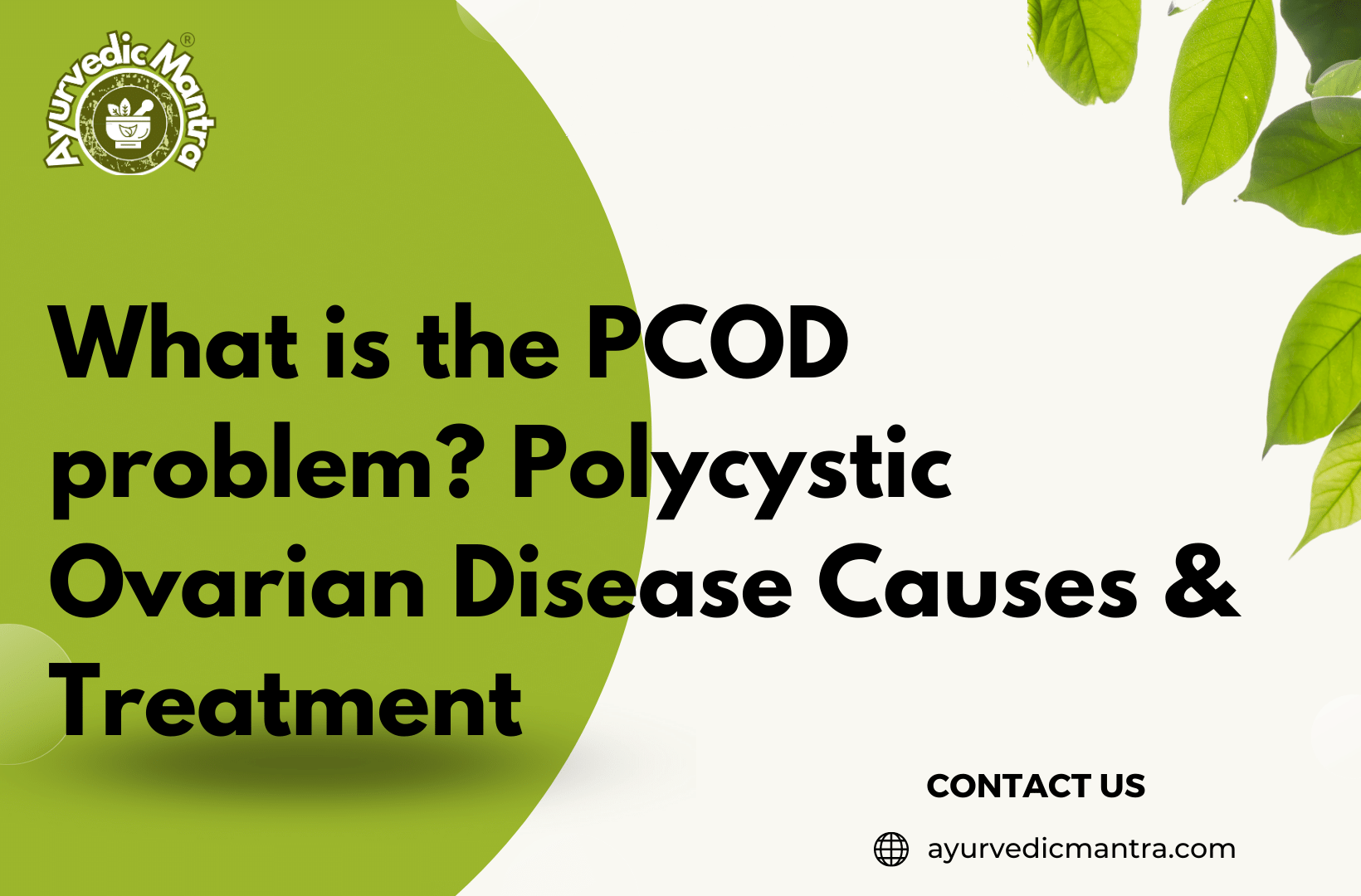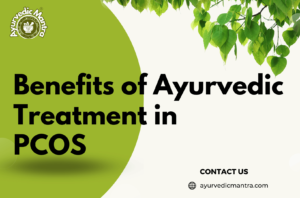
PCOD/PCOS: Ayurvedic Treatment is Best
Introduction Polycystic Ovary Disorder (PCOD) or Polycystic Ovary Syndrome (PCOS) is a common endocrine disorder affecting millions of women worldwide. It leads to hormonal imbalances,


Polycystic Ovarian Disease (PCOD), also known as Polycystic Ovary Syndrome (PCOS), is a common hormonal disorder affecting women of reproductive age. It is characterized by hormonal imbalances that can lead to various symptoms and complications. This comprehensive article will delve into the causes, symptoms, diagnosis, and available treatments for PCOD.
The exact cause of PCOD is not fully understood, but it is believed to result from genetic and environmental factors. Insulin resistance and high levels of androgens (male hormones) play a significant role in developing PCOD. Family history and lifestyle choices, such as poor diet and lack of exercise, can also contribute to its onset.
PCOD presents a wide range of symptoms, which may vary from woman to woman. Common symptoms include:
Additionally, PCOD can lead to fertility issues and may increase the risk of developing type 2 diabetes and heart disease.
Diagnosing PCOD involves thoroughly evaluating a woman’s medical history, physical examination, and specific tests. Blood tests are conducted to measure hormone levels, including androgens and insulin. Ultrasound imaging is also utilized to identify the presence of cysts on the ovaries.
One of the most concerning aspects of PCOD for many women is its potential impact on fertility. Irregular ovulation and hormonal imbalances can make it difficult to conceive. However, early diagnosis and appropriate treatment can improve the chances of conception.
Making positive lifestyle changes can significantly aid in managing PCOD. Regular exercise, a balanced diet, and stress reduction techniques can help regulate hormone levels and improve insulin sensitivity. Maintaining a healthy weight is particularly important as it can positively influence the symptoms of PCOD.
The treatment approach for PCOD is tailored to the individual’s symptoms, medical history, and future fertility plans. Birth control pills are often prescribed to regulate menstrual cycles and reduce androgen levels. Metformin, a medication commonly used to manage type 2 diabetes, may be recommended to improve insulin sensitivity.
For women trying to conceive, various fertility treatments may be considered. Ovulation-inducing medications, such as Clomiphene, can stimulate egg release. Assisted reproductive technologies (ART) like in vitro fertilization (IVF) may be suggested in more complex cases.
Dealing with the cosmetic effects of PCOD, such as acne and excessive hair growth, can be emotionally challenging. Dermatological treatments and hair removal methods like laser therapy can be beneficial in managing these concerns.
Living with PCOD can be emotionally taxing, especially when dealing with infertility and other related challenges. Seeking support from loved ones and mental health professionals can be instrumental in coping with the psychological impact of the condition.
Regular medical check-ups are essential for monitoring PCOD symptoms and promptly addressing any changes. Early intervention can help prevent complications and improve the overall quality of life for women with PCOD.
Polycystic Ovarian Disease is a complex and multifaceted condition that affects many women worldwide. Understanding the causes, symptoms, and available treatments is crucial in managing PCOD effectively. By adopting a healthy lifestyle, seeking medical guidance, and addressing the emotional aspects of the condition, women with PCOD can lead fulfilling lives and overcome its challenges.
Remember, each individual’s experience with PCOD is unique, and it’s essential to consult a healthcare professional for personalized advice and treatment.
Polycystic Ovarian Disease (PCOD), also known as Polycystic Ovary Syndrome (PCOS), is a hormonal disorder that affects women’s reproductive system. It is characterized by an imbalance of hormones, particularly increased androgens (male hormones) and insulin resistance. PCOD can lead to various symptoms, including irregular or absent menstrual periods, acne, excessive hair growth (hirsutism), and weight gain. Additionally, it may cause fertility issues and increase the risk of developing type 2 diabetes and heart disease.
The exact cause of PCOD is not fully understood, but it is believed to result from genetic and environmental factors. Family history plays a role, as women with a family history of PCOD are more likely to develop the condition. Additionally, lifestyle factors such as a sedentary lifestyle, poor diet, and excessive stress can contribute to developing PCOD. Insulin resistance is also a significant factor, leading to increased insulin levels in the blood, which can disrupt hormone balance.
Diagnosing PCOD involves a comprehensive evaluation of a woman’s medical history and a physical examination. Specific tests are also conducted to confirm the diagnosis. Blood tests are used to measure hormone levels, including androgens and insulin. Ultrasound imaging is employed to visualize the ovaries and identify the presence of cysts. The diagnosis is based on the presence of specific criteria, such as irregular menstrual cycles, elevated androgen levels, and the presence of ovarian cysts.
Yes, PCOD can have a significant impact on fertility. The hormonal imbalances and irregular ovulation associated with PCOD can make it challenging for women to conceive. However, it is essential to remember that not all women with PCOD will experience fertility issues. Early diagnosis and appropriate treatment can improve the chances of conception for women with PCOD.
The treatment approach for PCOD is individualized based on the woman’s symptoms, medical history, and future fertility plans. Lifestyle modifications are often recommended as the first line of treatment. This includes adopting a healthy diet, exercising regularly, and managing stress. Birth control pills may be prescribed to regulate menstrual cycles and reduce androgen levels. Metformin, a medication commonly used for managing type 2 diabetes, may be recommended to improve insulin sensitivity. For women trying to conceive, ovulation-inducing medications like Clomiphene may be used, and in more complex cases, assisted reproductive technologies (ART) such as in vitro fertilization (IVF) may be considered.
Sometimes, mild PCOD symptoms can be effectively managed through lifestyle changes alone. A healthy lifestyle, including a balanced diet, regular exercise, and stress reduction techniques, can help regulate hormone levels and improve insulin sensitivity. For women with mild PCOD, lifestyle changes may be sufficient to alleviate symptoms and restore hormonal balance.
PCOD can lead to several complications if left untreated. These include an increased risk of developing type 2 diabetes and heart disease due to insulin resistance. Additionally, long-term hormonal imbalances can lead to irregular menstrual cycles, infertility, and difficulty managing weight. Women with PCOD may also experience emotional challenges due to cosmetic issues like acne and hirsutism.
PCOD is a chronic condition that requires long-term management. While there is no cure for PCOD, its symptoms can be effectively managed through lifestyle changes, medication, and other treatments. Many women with PCOD can lead healthy and fulfilling lives with appropriate management.
While lifestyle changes are considered the cornerstone of PCOD management, some natural remedies and alternative treatments may complement traditional medical approaches. These may include herbal supplements, acupuncture, and yoga. However, it is essential to consult a healthcare professional before trying alternative treatments to ensure they are safe and appropriate for individual cases.
The exact cause of PCOD is not fully understood, so there is no guaranteed way to prevent its development. However, adopting a healthy lifestyle, maintaining a balanced diet, staying physically active, and managing stress may help reduce the risk of PCOD and promote overall well-being.

Introduction Polycystic Ovary Disorder (PCOD) or Polycystic Ovary Syndrome (PCOS) is a common endocrine disorder affecting millions of women worldwide. It leads to hormonal imbalances,

Introduction Losing weight is a journey that requires dedication, consistency, and self-care. While there are numerous weight loss techniques out there, not all of them

Polycystic Ovary Syndrome (PCOS) is a hormonal disorder that affects millions of women worldwide. It can lead to various health complications, such as irregular periods,

In recent years, Ayurveda, an ancient system of natural healing originating from India, has gained significant popularity as an alternative approach to treating various health

आजकल वजन बढ़ने और चर्बी की वृद्धि होने की समस्या एक आम समस्या बन गई है। बढ़ते वजन और अतिरिक्त चर्बी के कारण न केवल

प्रस्तावना: आजकल वजन बढ़ने और ओबेसिटी की समस्या एक आम समस्या बन गई है। बढ़ते वजन के कारण न केवल शारीरिक समस्याएं होती हैं, बल्कि
